Part XII. Women Working in Nature and the Arts
Johanna Melchiore is an amazing woman and the wife of Ron Melchiore, whose book Life Off Grid: My Path to the Wilderness explores their road less traveled. Ron and Johanna currently live in the total wilds of Saskatchewan in a remote house they built themselves that overlooks Hockley Lake. Ron has also hiked the Appalachian Trail and biked the USA from one coast to the other, with Johanna joining him at intervals. Ron is the one who approached me almost two years ago about publishing their story, and he is the author–but Johanna is his incredible partner in this journey and an artist in her own right. The more I got to know the Melchiores, the more I was impressed. They are both artisans, having learned all the skills it takes to survive independently: building their own house, growing their own vegetables, making their own clothes and blankets/covers (weaving, quilting, knitting, sewing), preserving their own food, installing their own green energy systems (wind turbine and solar panels), and so on. I am delighted to talk with Johanna.
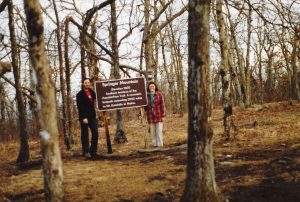
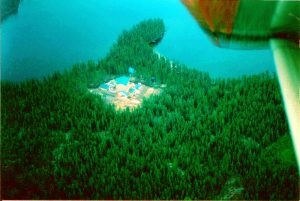
Mary: You and your husband Ron have been living off grid for a long time. Was it hard to adjust to this lifestyle?
Johanna: It has been a long time–over 30 years–since I made the transition to living off grid, but in looking back I don’t recall it being a difficult adjustment. From the time I was a teenager I had dreamed of homesteading and living off the land, and once I finally got the opportunity to do so, I was so excited and thrilled to be actually living my dream that my enthusiasm carried the day. This doesn’t mean there weren’t things to get used to. Once the novelty of doing certain jobs the hard way wore off, I was thankful to “modernize.” For example, initially we had a hand pump outside for our water. This meant every drop of water had to be carried in by bucket after we had stood at the well pumping away by hand. Not so bad on a nice day. But in the pouring rain or wind-driven snow that got old pretty quick. When we ran the water line into the house and had the hand pump at the kitchen sink, I thought I had died and gone to heaven. No more going outside in all kinds of weather to bring in the day’s water!
Mary: What are some reasons that people would want to set up a sustainable homestead in the wilderness, and why is this important to you?
Johanna: Without a doubt there are many reason why someone would want to set up a sustainable homestead–the desire to be as independent and self-sufficient as possible; to not rely on the gas company, oil company or electric company for heating, cooking, lighting and so forth; to not be a slave to ever-increasing energy costs; to grow as much of your own food as possible; to be your own boss and determine your own destiny. I think it is possible to do all these things without moving to the wilderness, but, for me, doing all these things in a wilderness setting is the capstone of a life spent pursuing the self-sufficient dream. Being able to live in such a remote location says I have fully embraced and come to terms with all the aspects that such a remote existence entails.
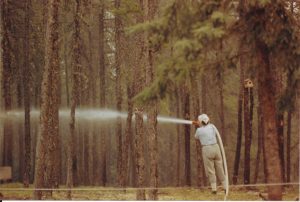
Mary: Going into this off-grid living, what previous experience did you have that proved super useful–and what other skills did you learn along the way?
Johanna: I had no previous experience with off-grid living, having grown up in a typical household hooked up to the electrical grid. These days there are outfits that can design and install an alternative energy system, so no knowledge or skill is required by the homeowner. People can live off-grid, work full-time jobs, and lead a typical modern life without any commitment to be self-sufficient in other areas of their life. Meaning they don’t have to plant a garden, preserve their food, raise their own meat, etc.
For me, though, I wanted the whole package. As a teen I got hooked on gardening, thanks to my dad. I learned how to can, freeze, and make jams from my mom. She also taught me the basics of knitting and sewing. I gained an understanding of carpentry by doing projects with my dad, although I don’t think I have enough skill that I can build a structure by myself. Raising animals, doing home butchering, and curing and smoking of meat were skills that I learned after I started living off-grid. Since then, I have taught myself how to spin yarn, how to weave, and how to hook rugs, but these skills aren’t truly necessary for life off-grid. Rather they compliment my lifestyle and satisfy my sense of self-actualization.
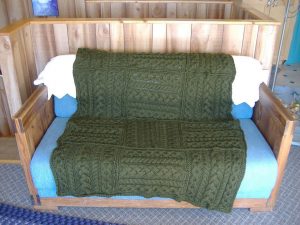
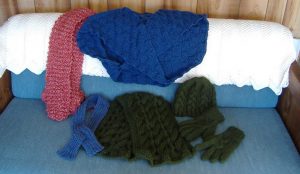
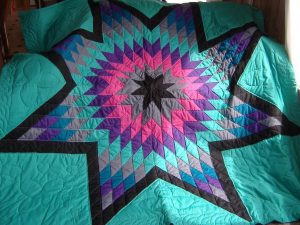
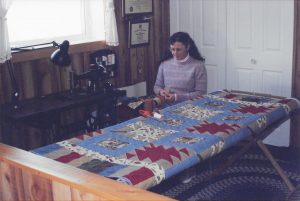
Mary: Do you see off-grid life as a nod back to olden times, a 1970s style back-to-land movement, a new solution to our environmental crises we see today? A little of all three, or none of the above?
Johanna: I would say a little of all three. Being off-grid, a person can live a spartan lifestyle similar to those by our ancestors, like we did for many years in Maine, or they can have as many modern conveniences as they choose. At present, we fall somewhere in the middle of spartan and all the modern conveniences, and I am very happy with the balance we have achieved. I would not want any more bells and whistles then we have right now.
As far as the back-to-the land movement of the 70’s, certainly being off-grid is a part of that whole way of thinking and living. But being off-grid doesn’t mean you have to be anti-establishment. Off-grid can and should be mainstream. People should be able to live fully modern lifestyles, yet be off the grid at the same time. For those who say alternative energy is not viable and brush it off as impractical, I have one thing to say: They are wrong! We are living proof of that.
Mary: I’ve seen your quilts and know that you have an artistic flair as well. Seems to be that your cooking is quite delicious as well. Please describe your creativity. What inspires you to make what you do?
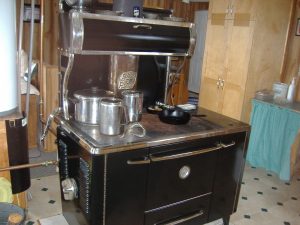
Johanna: I have always liked to do any type of needlework. This might stem from my days as a young girl when I would sit beside my mom and watch while she knitted, sewed, or did embroidery. Through the years, I have steadily challenged my skill level by selecting ever increasingly complicated knitting and quilting projects. Teaching myself to weave, armed with nothing but two books on the subject, was a good mental exercise. So I guess in addition to creating things, I like to be mentally tested too.
Regarding cooking. I like to cook and bake. (By the way I unfortunately like to eat too,especially sweets!) But more importantly, when you plant a garden and set out to raise as much of your own food as you can, you automatically make the commitment to spend time in the kitchen not only preserving your harvest but also preparing meals featuring all the foods you’ve grown. What a terrible waste of time and energy to grow food and then not utilize it. I’m not a chef, but our meals are home cooked from scratch and feature foods from our gardens. I derive a deep satisfaction from sitting down to a meal, most of which has been raised by my own two hands.
I don’t know that this qualifies as creativity, but in addition to growing the typical vegetables (peas, corn lettuce, tomatoes, etc.), I experiment with the lesser known veggies such as Belgian endive, Florence fennel, and leeks. This year I plan to try celeriac for the first time. Over the years some of these unusual vegetables have become staples and are regularly included in my garden plan. Additionally, by using various techniques, I am constantly pushing the envelope and trying to extend the growing season as much as possible in both spring and fall. I find it a rewarding challenge that I sometimes win and sometimes lose.
Mary: I do think that living independently involves a lot of creative skills and crafts that modern society has lost, for the most part. Do you ever miss your “old life”?
Johanna: No, never. I like waking up in the morning and deciding how I will spend my day. The only thing I miss from my “old life” is having a paycheck come in, but I do not and never did associate my self worth with a paycheck.
Mary: Would you like to add any other thoughts?
Johanna: Just this. We have taken the off-grid, homesteading lifestyle to the extreme. But it is not necessary to make such drastic changes. Anyone can step back, analyze their life and how they are living, and then choose to make minor or major changes ranging from planting a garden (either large or small), shopping at farmer’s markets, eating locally grown foods as opposed to foods grown on the other side of the world, installing a wood stove and heating with wood, putting up a few solar panels, hanging your wash out on the clothesline on nice days instead of using a dryer (one of my pet peeves), raising a few chickens for eggs, or a myriad of other choices. The point is select something and go with it. Don’t procrastinate any longer. Just do it!
Mary: Thank you so much, Johanna. I have a feeling we will keep in touch for a number of years, and I really hope someday I can visit!
Images copyright by Ron and Johanna Melchiore
Great questions and equally great answers. Have read the amazon version of the book and both publisher and author have done a beautiful job!
Great interview, admirable people, and the photos take us there… Another good book to add to my “must read” list.
Great questions and answers. Look forward to reading the book.